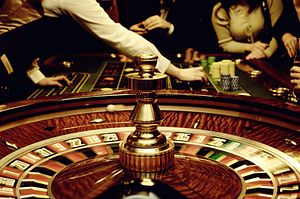In Japan, anyone feeling lucky can place a wager on their favorite horse, keirin bicycle, speedboat, or motorcycle – these four koei kyogi, or “public sports,” are the only outlets for legal betting. Of course, regular lotteries are held, and neon-lit pachinko parlors offer a kind of cross between pinball and a slot machine (albeit in a much louder, smokier environment) – but full-fledged casinos are currently illegal.
Sheldon Adelson, the chairman and chief executive officer of Las Vegas Sands Corporation, wants to change that. Sands, the world’s largest casino operator by market share, is willing to invest billions to make Japan the next big gambling destination in Asia.
“Would I put up $10 billion? Yes,” Adelson said at a media briefing in Tokyo yesterday.
“We will spend whatever it takes,” he added. “We could pay all cash. We don’t have to, but we will borrow money in a typical mortgage-to-value ratio.”
Credit Lyonnais Securities Asia (CLSA) estimates that Japan could generate $40 billion a year in gambling revenue if two large casinos were established – one each in Tokyo and Osaka – alongside ten smaller sites spread out between the northern island of Hokkaido and the southernmost island of Okinawa.
If the industry could meet expectations, Japan would solidify itself as Asia’s second-largest gambling market, second only to Macau. The former Portuguese colony – the only place in China where casinos are allowed – is on track to hit more than $50 billion in casino gaming revenue this year. In 2013, Macau’s glitzy casinos pulled in more than $42 billion – seven times more than the entire Las Vegas Strip combined.
For all of Adelson’s optimism, there is still the lingering issue of legality. Even $10 billion from Sands might not be enough to sway Japanese lawmakers. The firm may have a friend in current Prime Minister Shinzo Abe and his ruling Liberal Democratic Party (LDP). A bill that would legalize casinos was submitted by LDP lawmakers last December. A ruling is expected around May, and legalization could come as soon as 2016.
“Previous legalization efforts foundered, but with Abe’s support and Tokyo’s status as host of the 2020 Olympics providing momentum, the chances of success are now greater than ever,” wrote Businessweek. “Legalization has also won the support of prominent business leaders. Abe’s economic policies may also be helping win over former skeptics worried about the social ills associated with gambling.”
Abenomics, which has weakened the value of the yen, has also made international travel more expensive for Japanese tourists. Domestic casinos might sway them from traveling to regional gambling locales such as South Korea, Macau, Singapore and the Philippines.
Conversely, the weaker yen has made Japan a more attractive destination for foreigners. Casinos could add to the country’s appeal. Singapore, for example, with a population less than half of Tokyo’s, manages to attract nearly 50 percent more foreign visitors a year than the whole of Japan.
“We’ve finally drawn the attention of top-level politicians,” Osaka University of Commerce Professor Toru Mihara, who was involved in drafting the casino legalization bill, told The Wall Street Journal. “Casinos, if successful, will be a true flagship feature of Abenomics.”
Japan also has a home-grown market for slot and gaming machine design and manufacturing. Sega and Konami are often associated with traditional arcade and home console video games, but both Japanese firms produce gambling equipment – and both have expressed interest in the potential domestic casino business.

































